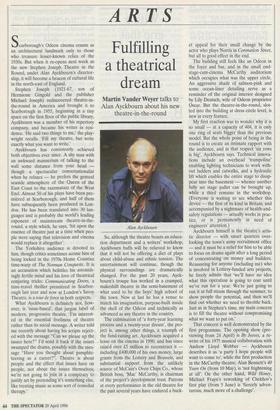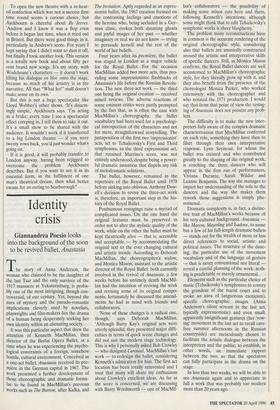ARTS
Fulfilling a theatrical dream
Martin Vander Weyer talks to Alan Ayckbourn about his new theatre-in-the-round Scarborough's Odeon cinema counts as an architectural landmark only to those who treasure lesser-known relics of the 1930s. But when it re-opens next week as the new Stephen Joseph Theatre in the Round, under Alan Ayckbourn's director- ship, it will become a beacon of cultural life in the north-east of England.
Stephen Joseph (1921-67, son of Hermione Gingold and the publisher Michael Joseph) rediscovered theatre-in- the-round in America and brought it to Scarborough in 1955, beginning in a tiny space on the first floor of the public library. Ayckbourn was a member of his repertory company, and became his writer in resi- dence. 'He said two things to me,' the play- wright recalls. 'Fill my theatre, but write exactly what you want to write.'
Ayckbourn has consistently achieved both objectives ever since. A shy man with an awkward mannerism of talking to the wall some distance from your head though a spectacular conversationalist when he relaxes — he prefers the genteel seaside atmosphere of the Queen of the East Coast to the razzmatazz of the West End. Almost 50 of his plays have been pre- mièred at Scarborough, and half of them have subsequently been produced in Lon- don. He has been translated into 30 lan- guages and is probably the world's leading exponent of mainstream theatre-in-the- round, a style which, he says, 'hit upon the essence of theatre just at a time when peo- ple were saying that television and cinema would replace it altogether'.
The Yorkshire audience is devoted to him, though critics sometimes accuse him of being locked in the 1970s Home Counties time-warp of The Norman Conquests. It is an accusation which belittles his astonish- ingly fertile mind and his love of theatrical conjuring tricks: Communicating Doors, a time-travel thriller premiered in Scarbor- ough last year and now at London's Savoy Theatre, is a tour de force in both respects.
What Ayckbourn is definitely not, how- ever, is 'issue-based', that jargon label of modern, progressive theatre. 'I'm interest- ed in the essential liveliness of theatre rather than its social message. A writer told me recently about having his scripts reject- ed with the message "Can we please up the issues here?" I'd send it back if the issues swamped the drama, possibly with the mes- sage "Have you thought about pamphle- teering as a career?". Theatre is about people and the effect that issues have on people, not about the issues themselves; we're not going to join in a conspiracy to justify art by pretending it's something else, like treating music as some sort of remedial therapy.' Alan Ayckboum So, although the theatre boasts an educa- tion department and a writers' workshop, Ayckbourn buffs will be relieved to know that it will not be offering a diet of plays about child-abuse and ethnic tension. The entertainment will continue, though the physical surroundings are dramatically changed. For the past 20 years, Ayck- bourn's troupe has worked in a cramped, makeshift theatre in the semi-basement of what used to be the boys' high school of the town. Now at last he has a venue to match his imagination, purpose-built inside the shell of the Odeon and technically as advanced as any theatre in the country.
The culmination of 'a forty-year learning process and a twenty-year dream', the pro- ject is, among other things, a triumph of the fund-raising art. Ayckbourn acquired a lease on the cinema in 1990, and has since raised over £5 million to reconstruct it including £400,000 of his own money, large grants from the Lottery and Brussels, and substantial support from the unlikely source of McCain's Oven Chips Co., whose British boss, 'Mac' McCarthy, is chairman of the project's development trust. Patrons at every performance in the old theatre for the past several years have endured a buck- et appeal for their small change by the actor who plays Norris in Coronation Street, but all to good effect in the end.
The building still feels like an Odeon in the foyer and bar, and in the small end- stage-cum-cinema McCarthy auditorium which occupies what was the upper circle. An aggressive shade of salmon-pink and some ocean-liner detailing serve as a reminder of the original interior designed by Lily Deutsch, wife of Odeon proprietor Oscar. But the theatre-in-the-round, slot- ted into the building at dress circle level, is new in every feature.
My first reaction was to wonder why it is so small — at a capacity of 404, it is only one ring of seats bigger than the previous model. But the whole point of being in the round is to create an intimate rapport with the audience, and in that respect 'six rows is big', Ayckbourn says. Technical innova- tions include an overhead 'trampoline' enabling lighting technicians to work with- out ladders and catwalks, and a hydraulic lift which enables the entire stage to disap- pear into the basement — whence another fully set stage pallet can be brought up, while a third remains in the workshop. (Everyone is waiting to see whether this device — the first of its kind in Britain, and accompanied by a nightmare of health-and- safety regulations — actually works in prac- tice, or is permanently in need of engineers' attention.) Ayckbourn himself is the theatre's artis- tic director — with smart quarters over- looking the town's army recruitment office — and it must be a relief for him to be able to focus on drama again after a long period of concentrating on money and builders. Reassuring for anyone (including me) who is involved in Lottery-funded arts projects, he freely admits that 'we'll have no idea what this operation is going to cost until we've run for a year. We're just going to run it at full steam through the summer, to show people the potential, and then we'll find out whether we need to throttle back. Just as in Stephen's time, my main concern is to fill the theatre without compromising what we want to put on.'
That concern is well demonstrated by the first programme. The opening show (pre- viewing from 24 April) is By Jeeves, a re- write of his 1975 musical collaboration with Andrew Lloyd Webber — Ayckbourn describes it as 'a party I hope people will want to come to', while the first production in the McCarthy theatre, Alan Bennett's 40 Years On (from 10 May), is 'not frightening at all'. On the other hand, Wild Honey, Michael Frayn's reworking of Chekhov's first play (from 5 June) is 'fiercely adven- turous, much more of a challenge'. To open the new theatre with a re-heat- ed confection which was not a success first time round seems a curious choice, but Ayckbourn is cheerful about By Jeeves. `Andrew and I knew it was a flop even before it began last time, when it tried out in Bristol. But there were good things in it, particularly in Andrew's score. For years I kept saying that I didn't want to dust it off, but finally I took another look. This version is a totally new book and about fifty per cent brand new songs. It's my story, with Wodehouse's characters — it doesn't work lifting his dialogue en bloc onto the stage, because so much of his artistry is in the narrative. All that "What ho!" stuff doesn't make sense on its own.'
But this is not a huge spectacular like Lloyd Webber's other shows. 'It's disarm- ingly simple,' Ayckbourn says. 'I'm acting as a brake: every time I see a spectacular effect creeping in, I tell them to take it out. It's a small show to be shared with the audience. It wouldn't work if it transferred to a big London theatre — if you were twenty rows back, you'd just wonder what's going on.'
If it is good, it will probably transfer to London anyway, having been rejigged to overcome the problem Ayckbourn describes. But if you want to see it in its essential form, in the fulfilment of one man's theatrical dream, then what better excuse for an outing to Scarborough?



































































 Previous page
Previous page